Defence tops ministry bribe chart in new EACC report

ANTHONY OMUYA | NATION
Ethics and Anti-Corruption Commission chairman Mumo Matemu (right) presents the national survey on corruption report to Attorney General Githu Muigai at the KICC in Nairobi Tuesday.
What you need to know:
- A similar report, the National Survey on Corruption and Ethics, 2012, also released Tuesday names the Ministry of Interior and National Coordination as the most corrupt in the country.
The Ministry of Defence has made an entry into the top league of the most corrupt departments of government, according to a ranking by the Ethics and Anti-Corruption Commission.
Based on research conducted in November last year, the Defence ministry was the place where you were most likely to be asked for a bribe: One in four people who sought services there paid a bribe.
The EACC baseline survey report dated June 2013 also says that 18 out of every 100 people who sought services from the Provincial Administration paid a bribe.
Quite apart from the rankings, the research shows how pervasive corruption is in Kenya — people pay bribes everywhere they seek services.
The Attorney General’s chambers is the cheapest place to pay a bribe, with the average being Sh500. Public colleges and universities are the centres of extortion, according to the survey, and those who go there for service pay through the nose. They come tops by charging the highest average bribe of Sh81,000.
Banks and schools
The baseline survey report, which was distributed at the Kenyatta International Conference Centre Tuesday, is based on interviews with 2,240 people as well as 264 entrepreneurs.
It revealed that on average, Sh50,000 bribe is paid at banks and micro-finance institutions, Sh40,625 at the Treasury, Sh25,857 at the Ministry of Education, Sh21,000 at schools and Sh19,000 at the Judiciary.
A similar report, the National Survey on Corruption and Ethics, 2012, also released Tuesday names the Ministry of Interior and National Coordination as the most corrupt in the country.
The report launched by Attorney General Githu Muigai shows the Kenya Police is the most corrupt department in the country.
The National Survey on Corruption and Ethics, 2012, indicates that the Ministry of Interior, formerly Internal Security, is followed by former ministries of Lands, Public Health, Local Government, Immigration, Finance, Agriculture, Medical Services and Transport.
However, the EACC baseline survey report says the Defence ministry, which leads in corruption at 50 per cent is followed by that of Transport (47.6), Provincial Administration (29.2), Mombasa Water and Sewerage Company (27.3), Ministry of Internal Security (26.3) and Kenya Police (25.3).
The report noted low demand of bribes at the ministries of Agriculture, Medical Services, banks and micro finance institutions, Nairobi Water and Sewerage Company and public colleges and universities.
The survey says the largest share of bribes reported to have been paid by respondents (15.4 per cent) went to the Lands ministry, followed by Immigration Department (14.7), the Judiciary (11.5), Kenya Police (10.8), the Treasury (Sh8.1) and the Ministry of Education (5.1).
The EACC said the survey sought to find out causes and effects of corruption and to establish the presence or absence of political will to fight the vice and economic crimes.
Income disparity
Most respondents felt corruption was mainly due to greed, poverty or income disparity, poor remuneration and culture.
Lack of transparent and accountable political process as well as lack of effective corruption reporting systems were cited as main causes of corruption in the country and that the vice had resulted in underdevelopment, poverty and poor service delivery.
“One very negative finding from the public officials’ and entrepreneurs in this survey is that both of these groups believe that the current Kenyan government has no genuine desire to fight corruption and that the anti-corruption strategies are not effective,” the report said.
Sixty-two per cent of respondents in the survey done in 20 counties said there is no sincere desire by the government to fight corruption.
Slow service delivery leading to delays and frustration was cited as the leading unethical conduct in the public service. However, the number of corruption cases reported last year dropped by 26 per cent from 7,109 in 2011 to 5,230.
Additional reporting BEVERLY NDEGE
[email protected]





